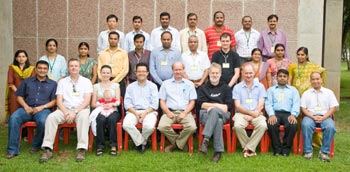
Participants of the NGS workshop at Patancheru.
ICRISAT, in collaboration with the CGIAR Generation Challenge Programme (GCP), hosted the second International Workshop on Next Generation Sequencing (NGS) Data Analysis, from 1 to 3 November, at Patancheru. This is in continuation of the first workshop hosted in July 2009.
Rapid advancement of sequencing technologies such as NGS enable the resequencing of entire plant genomes/sampling of entire transcriptomes more efficiently and economically. DDG-R Dave Hoisington, in the inaugural session said, “Just sequencing individual genomes, it is possible to sequence hundreds or even thousands of related genomes to sample genetic diversity within and between germplasm pools. Identifying and tracking genetic variation is now so efficient and precise that thousands of variants can be tracked within large populations.” He hoped that the scientific community across the world would be able to sequence the thousands of genebank accessions including accessions in the CGIAR genebanks.
GTL-Biotechnology Oscar Riera-Lizarazu said that NGS technologies had significant implications on crop breeding. He also expressed happiness that ICRISAT is preparing to undertake large scale NGS projects in the future.
Outlining the objective of the workshop, Rajeev Varshney said, “Although generation of sequence data is becoming faster and cheaper, the optimization and availability of appropriate methodologies and tools to analyze, visualize and interpret NGS data are still in their infancy”. He acknowledged the support of GCP to sponsor the NGS data analysis project and this workshop, as it will help ICRISAT, CG Centers and national partners to develop strategies and a road map to overcome the challenges of the massive amount of sequence data being generated as part of different projects.
He also acknowledged the support of Trushar Shah, Abhishek Rathore, R Pradeep, A Bhanuprakash, team members of the NGS project at ICRISAT, and of B Manjula and KDV Prasad for their support in organizing the workshop.
About twenty participants from seven countries including Australia, China, France, India, the Philippines, South Africa and UK participated in this workshop.
Source: ICRISAT Happenings
